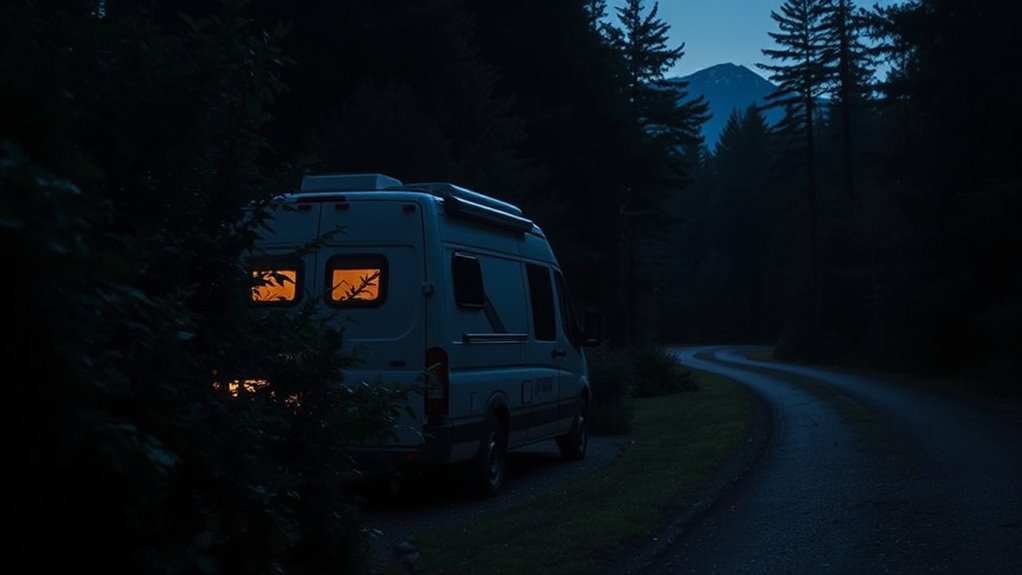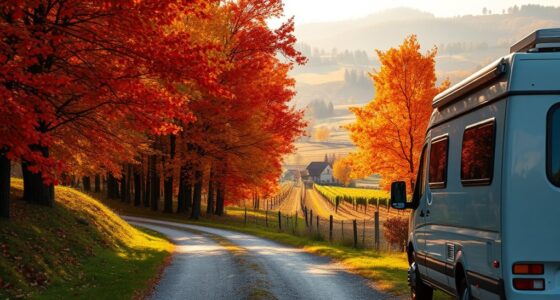To stay safe and legal while stealth camping with your campervan, always research local parking laws beforehand. Look for quiet, discreet spots like pull-offs or designated rest areas, and avoid private or restricted zones. Keep noise and lights to a minimum, respecting wildlife and surroundings. Inform someone about your location and stay adaptable to your environment. Mastering these tips helps you enjoy peaceful, eco-friendly nights—continue exploring for more expert advice to make your adventure truly seamless.
Key Takeaways
- Research local laws and signage to ensure overnight parking is permitted in your chosen location.
- Select discreet spots like pull-offs or quiet side roads that do not violate restrictions.
- Keep noise and lights minimal to avoid attracting unwanted attention from neighbors or wildlife.
- Inform someone of your location and check-in regularly, especially in areas with limited cell service.
- Respect wildlife and environment by avoiding fragile areas and maintaining a low impact footprint.

Stealth camping with a campervan offers a flexible way to explore new places without drawing unwanted attention or paying for campsite fees. It allows you to immerse yourself in the natural environment, waking up to sunrise views and experiencing the quiet of remote areas. However, to do this safely and legally, you need to stay aware of parking regulations and respect local wildlife encounters. Knowing where you can park overnight is essential; many areas have strict rules about overnight parking, so you must research local laws beforehand. Look for signs that indicate restrictions, and avoid parking in private property, restricted zones, or areas marked as no overnight parking. Choosing discreet spots, such as pull-offs, quiet side roads, or designated rest areas, helps you blend into the surroundings and minimizes the risk of disturbance or fines.
Stealth camping safely requires respecting parking laws and wildlife, choosing discreet spots, and minimizing environmental impact.
When selecting a parking spot, consider the impact on wildlife. Stealth camping often places you near natural habitats where animals thrive. It’s imperative not to disturb these environments. Keep noise levels low, especially during dawn and dusk when many animals are most active. If you encounter wildlife, observe from a distance and don’t attempt to feed or approach them. Respecting their space keeps you safe and preserves their habitat, ensuring that your camping experience remains sustainable and enjoyable for future adventurers. Remember, wildlife encounters can be unpredictable, so always stay alert and prepared to move if you notice signs of animals nearby.
Your awareness of parking regulations and wildlife encounters not only keeps you safe but also helps protect the environment. When parking overnight, be mindful of your surroundings—avoid parking on fragile vegetation or in areas prone to flooding. Use your vehicle’s lights sparingly at night to avoid attracting unwanted attention from both people and animals. If you’re in a more remote location, let someone know your plans and check in regularly, especially if you’re venturing into areas with limited cell service. Being respectful of local rules and wildlife ensures your stealth camping experience remains enjoyable and trouble-free. Additionally, understanding the importance of cookie categories can enhance your online safety and privacy while planning your trip.
Ultimately, successful stealth camping hinges on your ability to adapt and stay informed. By carefully choosing your parking spots, respecting wildlife boundaries, and adhering to local regulations, you can enjoy the freedom and adventure of campervan stealth camping while staying safe and within the law. This mindful approach will deepen your connection to the places you explore, making your journey both memorable and responsible.
Frequently Asked Questions
Can I Legally Camp in National Parks Unnoticed?
No, you can’t legally camp unnoticed in national parks. Parking regulations are strict, and overnight camping without permission can lead to fines or eviction. Parks prioritize conservation, so camping on private property without consent is illegal and risky. To stay safe and legal, always research park rules, seek designated campgrounds, and get proper permits if needed. Stealth camping might seem tempting, but respecting regulations guarantees a trouble-free adventure.
What Are the Best Cities for Stealth Camping?
You can find great cities for stealth camping by exploring areas with relaxed urban restrictions and lenient local ordinances. Look for smaller, less regulated cities where overnight parking is more tolerated, and avoid high-security zones. Cities with a vibrant, diverse culture often have hidden spots where you can stay discreetly. Always research local rules beforehand, respect private property, and stay alert to avoid drawing unwanted attention.
How Do I Avoid Fines During Stealth Camping?
To avoid fines during stealth camping, always check parking restrictions and local ordinances beforehand. You should look for areas where overnight parking is permitted, and avoid posted no-parking zones. Use apps or local resources to confirm rules, and be discreet with your campervan. Respect private property, keep noise minimal, and leave no trace. Staying informed and cautious helps you enjoy stealth camping safely without risking fines.
Is It Safe to Stealth Camp Alone?
Stealth camping alone can be safe if you take proper safety precautions. Always choose well-lit, populated spots to reduce privacy concerns and avoid suspicion. Keep your doors locked, stay aware of your surroundings, and trust your instincts. Share your plans with someone you trust, and carry safety gear like a whistle or pepper spray. By staying vigilant and respecting your environment, you can enjoy your adventure safely and confidently.
What Privacy Measures Protect My Belongings?
Think of your belongings as treasures in a hidden vault. To protect them, you should implement security precautions like locking all doors and windows, avoiding obvious valuables, and using discreet storage. Theft prevention also means staying alert, not attracting unnecessary attention, and keeping valuables out of sight. These measures help maintain your privacy and ensure your belongings stay safe, even when you’re tucked away in a quiet spot.
Conclusion
By embracing the art of discreet parking, you open the freedom to explore hidden corners and serene spots away from the crowds. With a keen eye for detail and respect for your surroundings, you can enjoy peaceful nights under starry skies, feeling truly connected to your journey. Just remember, a touch of subtlety and mindfulness keeps your adventures smooth and your spirit free. After all, the best memories often come from the quietest, most unassuming places.










